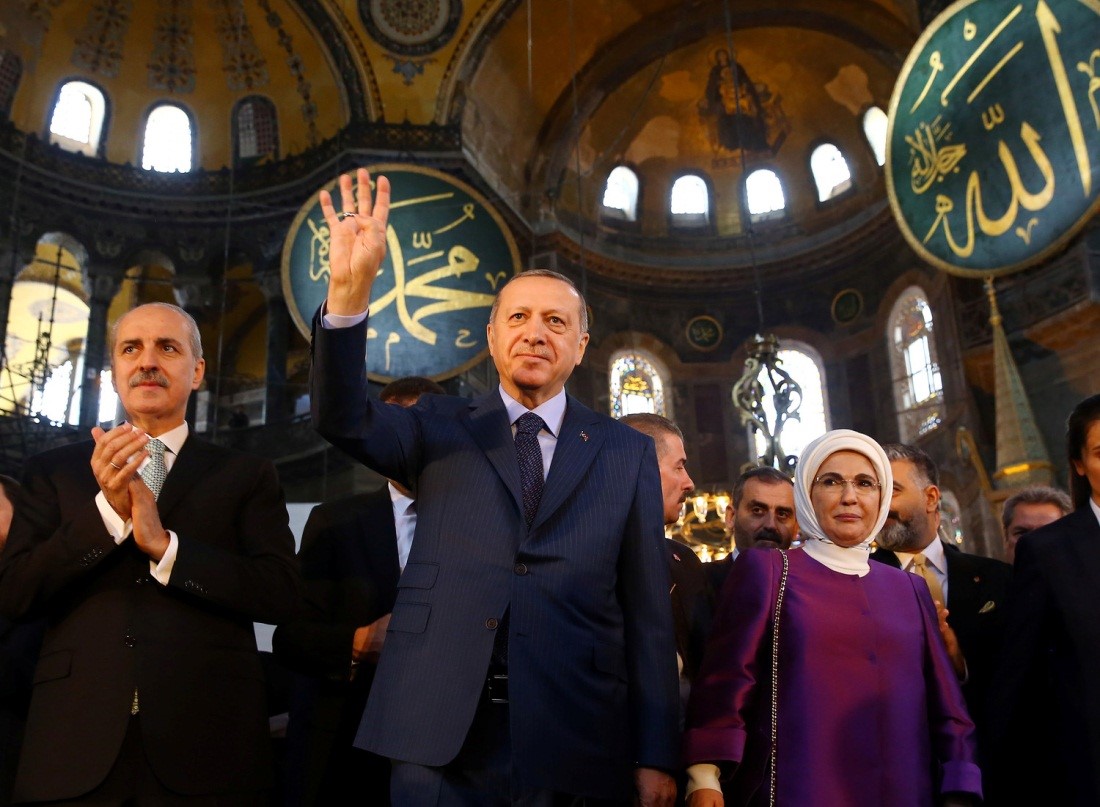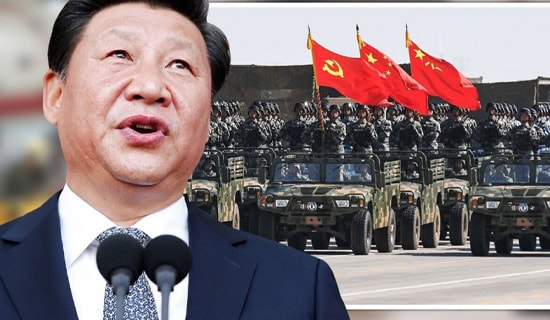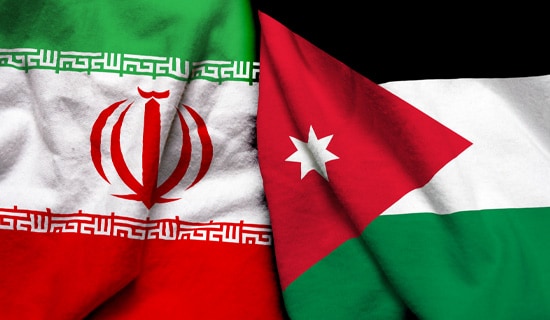Russian President Vladimir Putin passed on the opportunity to play defender of Christianity, and accepted Turkish President Recep Tayyip Erdoğan's decision to change the status of the Byzantine St. Sophia cathedral (Hagia Sophia) from a museum back into a mosque.
Despite the fact that Putin has, during his years in power, seen the Russian Orthodox Church as a means for projecting Russian soft power and his status as defender of traditional values to bolster his own legitimacy, the Kremlin preferred to decline to comment on Erdoğan's decree, signed July 10, and declared that Hagia Sophia's transfer of control of the site to the Religious Affairs Directorate is Turkey's internal affair.[1][2]
Relations between Russia and Turkey have been complicated. However, the Kremlin's cumulative discontent with Ankara notwithstanding, it seems unwilling to ruin the still-fragile Russia-Turkey alliance that Moscow has been trying to strengthen since the two countries mended relations in 2016 after Erdoğan apologized to Putin over the Turkish military's shooting down of a Russian air force jet.[3]
Below is an overview of the Kremlin's muted reaction to Erdoğan's move to change Hagia Sophia back into a mosque:

Turkish President Erdoğan arrives at Hagia Sophia for Friday prayers (Source: Gazeta.ru)
Putin's Phone Call With Erdoğan
On July 13, Putin spoke with Erdoğan on the phone, in a call initiated by the Turkish side. In the conversation, Putin drew Erdoğan's attention to the considerable public outcry in Russia over his decision to change Hagia Sophia back into a mosque, 86 years after it was declared a museum.
However, the Kremlin website stressed that Erdoğan "gave relevant explanations" in response, and added that he had "noted that access to that unique monument of world civilization would be guaranteed for all wishing to visit it, including foreign nationals, and the safety of the items sacred [relics] to Christians would be assured."[4]
Russian Presidential Spokesperson Peskov: Hagia Sophia's Status Won't Damage Russia-Turkey Relations
On July 17, Russian presidential spokesperson Dmitry Peskov signaled, in an interview with local broadcaster Avtoradio, that Russia did not intend to press the issue, since the Kremlin's official position is that this is Turkey's internal affair. He further expressed confidence that the Turkish move would not damage Moscow-Ankara relations.
To the suggestion that the change in Hagia Sophia's status could be used to damage Russia-Turkey relations, Peskov replied: "No, I do not think that will happen. The official position of our state is that this is an internal affair of Turkey. That's for starters."
He continued: "Secondly, we are still hopeful that no matter what decision is made, our Turkish partners will keep in mind Hagia Sophia's status as an object of the UNESCO's world cultural heritage... What does that mean to take the sacred meaning into account? It means that Christians, our tourists who go there, have a chance to go inside. To speak mundanely."[5]
Peskov further suggested that the change could even be beneficial, observing that the admission fee for Hagia Sophia museum was quite expensive but that as a mosque admission would be free to all. He stated: "The Turkish partners explained that everything would be preserved in the best possible way, and everyone will be able to visit Hagia Sophia. Moreover, there were quite expensive tickets to the Hagia Sophia Museum. Now there will be no tickets, and admission will be free. In this regard, our tourists will benefit from this situation."[6]
SUPPORT OUR WORK

On July 14, the day after Erdogan's phone call with Putin, Peskov also declared that Moscow is "satisfied" with Turkey's pledge to keep Hagia Sophia open to visitors. He said: "We've heard the statements of our Turkish colleagues, above all the president of Turkey, who said that the Hagia Sophia will be preserved and remain open to visitors. We're satisfied."[7]
Putin's Phone Call With Greek Prime Minister Mitsotakis
On July 22, 2020, Greek Prime Minister Kyriakos Mitsotakis called Putin to discuss Erdoğan's decree, inter alia. It is worth noting that Mitsotakis was harshly critical of Turkey's decision to reconvert Hagia Sophia into a mosque "Greece categorically condemns Turkey's decision to convert Hagia Sophia to a mosque... [it] is an affront to its ecumenical character," Mitsotakis declared on the day Erdoğan signed the decree.[8]
However, the Kremlin website reported no condemnation of Turkey, describing the phone call as merely stressing the site's symbolism: "They [Mitsotakis and Putin] also considered the situation with the change in status of the Hagia Sophia church in Istanbul, underscoring the exceptional cultural, historical and spiritual value of this unique World Heritage Site and the importance of preserving it as a treasure of all mankind and a symbol of peace and accord," the Kremlin stated.[9]
It is also worth noting that Russia-Greece relations are not at their best. In addition to the diplomatic spats between the two countries – in 2018, Greece expelled Russian diplomats, accusing them of undermining national security[10] – in October 2019, the Greek Orthodox Church recognized the Orthodox Church of Ukraine (OCU). This came after the patriarch of Constantinople granted autocephaly (independence) to the OCU, creating the 2018 schism between the Russian Orthodox Church and the Ecumenical Patriarchate of Constantinople.[11] In November 2019, it was reported that the Russian Orthodox Church had announced also stopping the communion with the head of the Greek Church.[12] That same month, Russian protestors picketed the Greek Embassy in Moscow, calling Mitsotakis a U.S. stooge and accusing him of having pressured the Greek Church to grant autocephaly to the OCU in order to please Washington.[13]
Russian Deputy Foreign Minister Vershinin: External Forces Should Not Interfere In Turkey's Decision On Status Of Hagia Sophia
Also the Russian Foreign Ministry commented on the Hagia Sophia's new status. On July 13, Russian Foreign Ministry spokesperson Maria Zakharova stated that the ministry "regrets" Hagia Sophia's transformation into a mosque, commenting:
"We regret the decision of the Republic of Turkey's leaders to turn the Hagia Sophia cathedral museum into a mosque and resume Muslim services there.
"The 1934 decision on the status of the museum, adopted at the initiative of Mustafa Kemal Atatürk, the founder of the modern Turkish state, made the Hagia Sophia a symbol of peace and interfaith harmony for many decades and played an important role in promoting an atmosphere of religious tolerance and dialogue between nations.
"We hope that the management of the Hagia Sophia, which was a museum until recently and remains a sacred place for the entire Christian world as well as the heritage of global culture and Eurasian civilization, will fully comply with its status as a UNESCO World Heritage Site. We expect that any actions regarding this unique landmark will consider its exceptional meaning for believers all over the world."[14]
However, the same day, Russian Deputy Foreign Minister Sergei Vershinin told the press that external forces should not interfere in Turkey's decision on Hagia Sophia's status.[15] "You know that this issue has caused a public outcry in our country and beyond. In general, we consider this issue to be an internal affair of Turkey, in which neither we nor anyone else should intervene. At the same time, we highlight the importance of the building as a site that is part of world culture," Vershinin stated.[16]
[1] News.ru, July 17, 2020.
[2] Interfax-religion.com, July 17, 2020.
[3] See MEMRI Special Dispatch No. 6567, Russian Reactions To The Putin-Erdogan Meeting, August 10, 2016.
[4] Kremlin.ru, July 13, 2020.
[5] Interfax-religion.com, July 17, 2020.
[6] News.ru, July 17, 2020.
[7] Interfax-religion.com, July 14, 2020.
[8] Ekathimerini.com, July 10, 2020.
[9] Kremlin.ru, July 22, 2020.
[10] See MEMRI Special Dispatch No. 7589, Russia In The World – Russia-Greece Relations: Diplomatic Tit-For-Tat, July 26, 2020.
[11] Interfax-religion.com, October 30, 2019. See MEMRI Special Dispatch No.7716, Russian Orthodox Church Splits From Constantinople After Patriarchate Grants Ukrainian Church Independence From Moscow, FM Lavrov Blasts Patriarch Bartholomew Of Constantinople For Conniving With Washington, October 18, 2018.
[12] Interfax-religion.com, November 2, 2019.
[13] Interfax-religion.com, November 18, 2019.
[14] Mid.ru, July 13, 2020.
[15] Interfax-religion.com, July 13, 2020.
[16] Orthodoxtimes.com, July 13, 2020.




